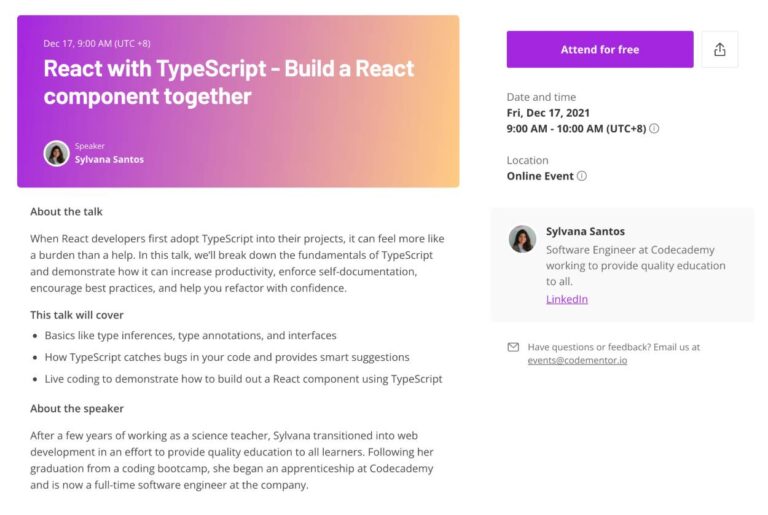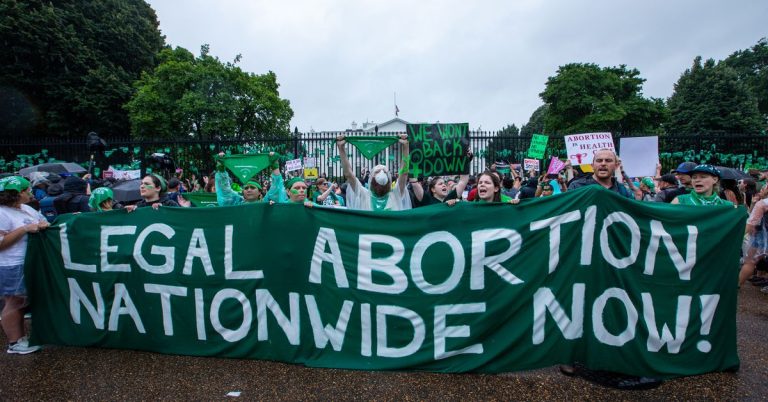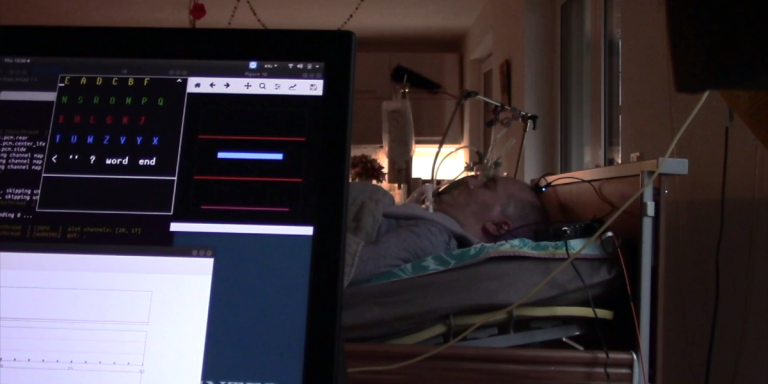
Bessemer, Alabama, is a city of 27,000 souls and dozens of churches. There are at least six Christian bookstores within a three-mile radius of the Waffle House, and a billboard screaming “When You Die, You Will Meet God!” not far from the local Walmart.
More than a quarter of those souls — about 71 percent of whom are Black — live below the poverty line. Sixteen miles from Birmingham proper, the city’s borders are liminal; Bessemer bleeds into nearby Brighton and Lipscomb to the north and McCalla to the south, and is sandwiched among wildlife refuges, cemeteries, and the Alabama Adventure & Splash Adventure waterpark. The precious few green spaces strain to offset the sprawl crowding the highway that cuts through town. Chain restaurants, car dealerships, and big-box stores line the route to Powder Plant Road, which leads to the former site of a US Steel factory. Now that hilly ground is home to an Amazon fulfillment center, and the site of one of the most important labor battles in America.
The more than 5,000 workers at Amazon’s Bessemer warehouse — called BHM1, it is one of more than 100 fulfillment centers across the US — are in the midst of the nation’s first attempt to unionize one of the e-commerce giant’s warehouses, where they spend long hours on their feet picking, packaging, and shipping items as quickly as they can. Their days, workers told Vox, are dictated by algorithms that survey their every move and dole out punishments when targets are not met or workers go over their allotted “time off task” (better known as TOT); workers compare the environment to “a sweatshop,” and have lodged complaints about the excessive heat in the building.
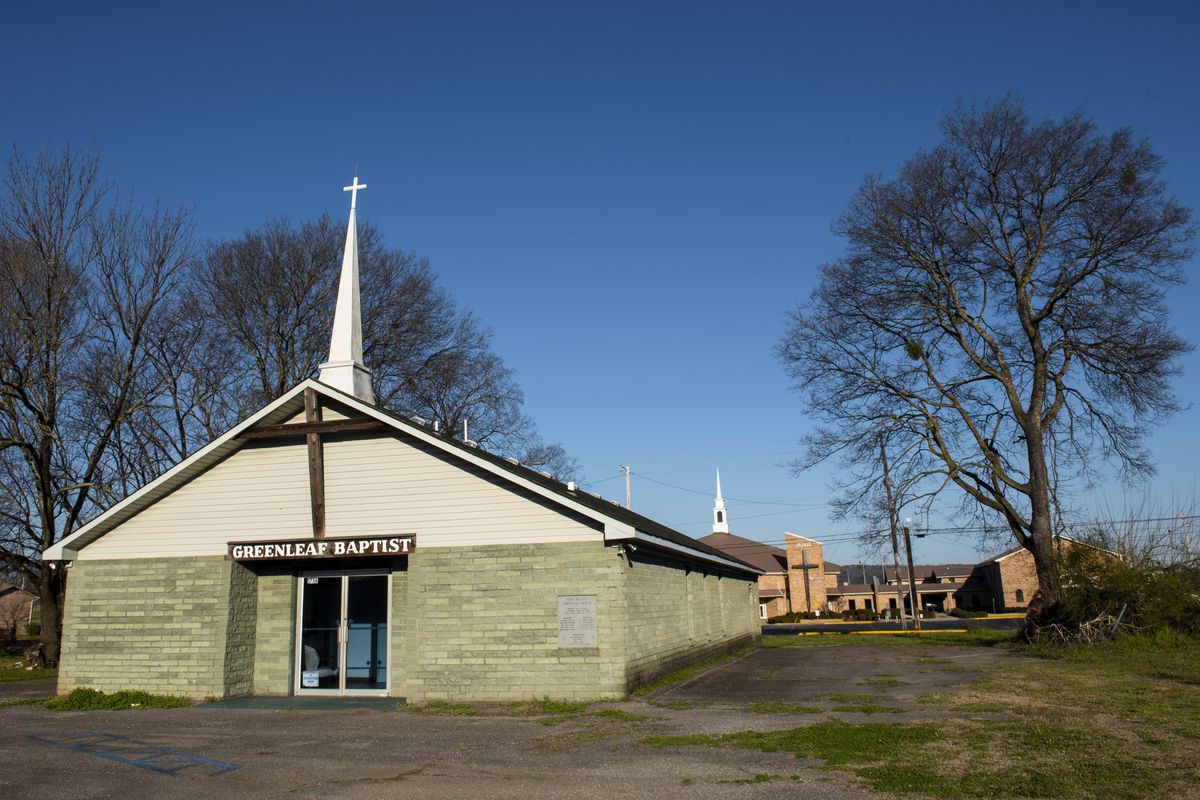
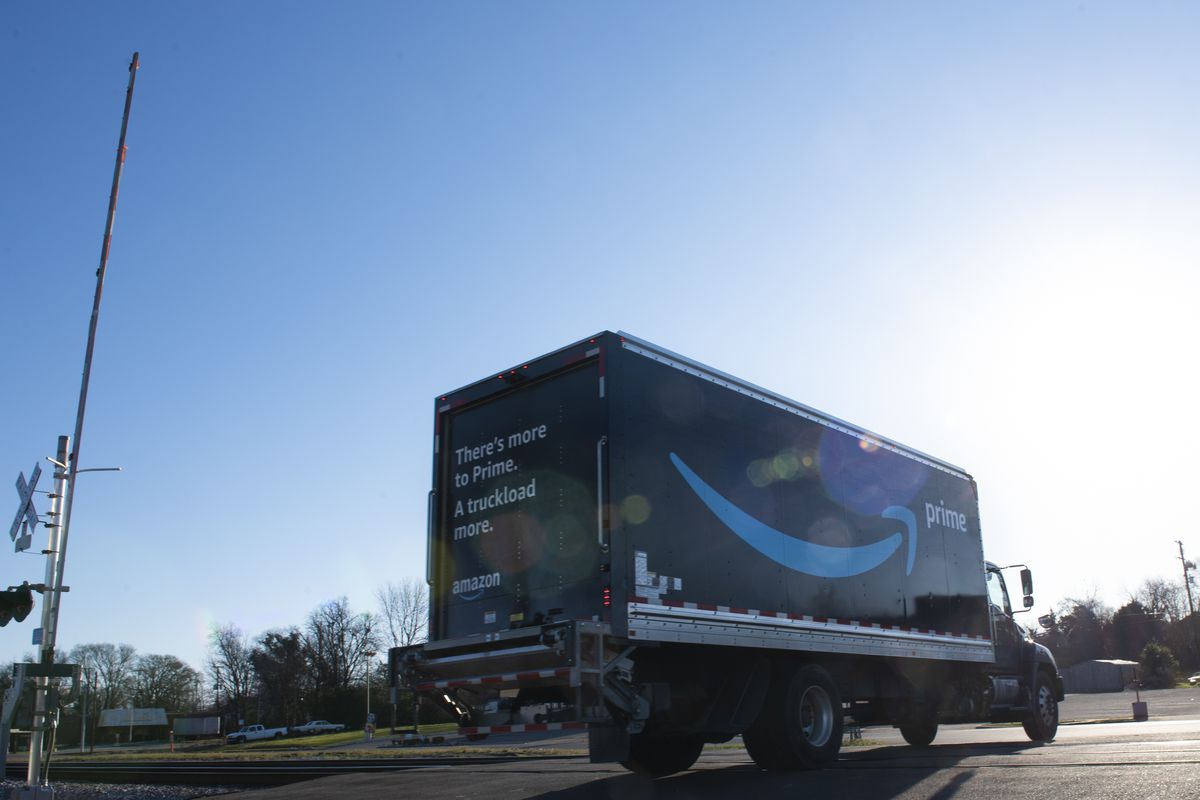
Workers say they are allowed two 15-minute bathroom breaks during their 10-hour shifts, which amounts to mere minutes to navigate a warehouse roughly the size of Buckingham Palace and get back to work on time. Though the Covid-19 pandemic continues to tear through Alabama and the rest of the world, the $2-per-hour “hazard pay” bump that the company touted at the beginning of the pandemic lapsed last June.
When Amazon announced in 2018 that it would be building a $325 million fulfillment center in this town of the faithful and bringing 1,500 jobs with it — the number ballooned in the ensuing months — the news sounded like a blessing. The company trumpeted its starting hourly pay rate of $15.30 and benefits; today, it wields them as a reason a union is unnecessary, without mentioning that wages in nearby unionized warehouses and poultry plants are much higher for similar work.
In a statement to Vox similar to one issued to other news organizations, Amazon spokesperson Heather Knox noted the starting pay, full health care, 401(k) match, and other benefits the company provides its Bessemer workforce. “We don’t believe [the retail workers’ union, under which the workers would organize] represents the majority of our employees’ views,” she wrote. “Our employees choose to work at Amazon because we offer some of the best jobs available everywhere we hire, and we encourage anyone to compare our total compensation package, health benefits, and workplace environment to any other company with similar jobs.”
But organizers say the union effort is not a fight over a $15 or $16 wage — though Amazon founder Jeff Bezos made nearly $75 billion in 2020. It is a matter of morality, of just who will make money off their labors. It’s a question of good and evil, about what is righteous, and just, and fair. For these workers and the organizers who have traveled from across the South to support their unionization effort, this is their David and Goliath story. What they want is dignity.
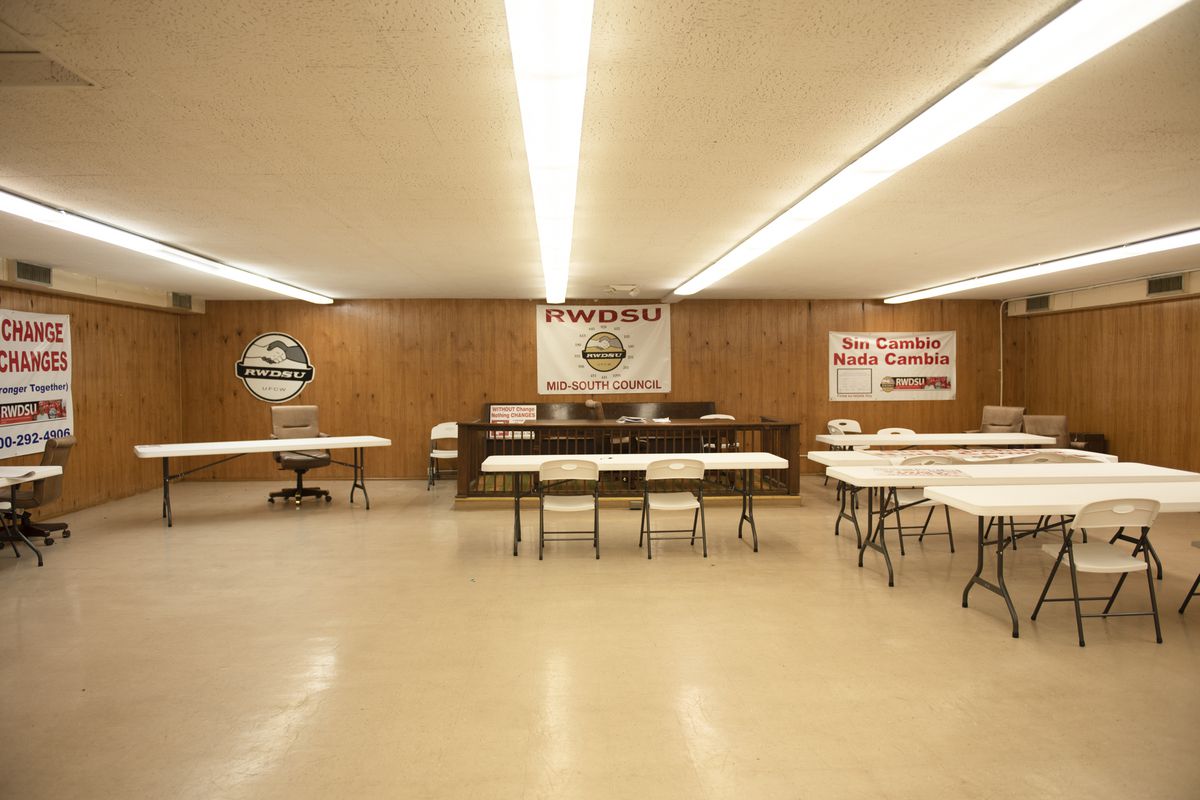
As Amazon has grown exponentially richer over the past year and banked eye-popping profits, those employed in the warehouse say that workers all around them have contracted Covid-19; some have died. (In October, Amazon reported that 20,000 of its workers companywide had contracted the coronavirus, but those numbers don’t reflect a sustained national spike in cases this winter.)
All of these factors and more fueled the union push; the first informal meetings between a handful of coworkers with prior union experience have since blossomed into full-blown organizing, with all the fervor of a spirited prayer meeting.
In February, more than 5,000 ballots were mailed out to the workers of BHM1, who now have until March 29 to vote on whether they will unionize and join the Retail, Wholesale and Department Store Union, a national organization that represents 100,000 workers in industries from retail to poultry processing.
Amazon’s response to the union drive has been remarkably hostile, even when the company’s well-documented anti-union stance is taken into account. After its initial attempt to delay the election failed, the company has been bombarding workers’ personal cellphones with anti-union text messages and papering the warehouse with anti-union signs and flyers, even posting them in the same bathroom stalls in which workers are allowed so little time for themselves.
Workers are pulled off the line and into classroom-style meetings in which management delivers long anti-union speeches that can last hours, and have had managers pull them aside to quiz them on their company loyalty. The company created a “Do It Without Dues” anti-union website, and has been requiring some of its contract workers — many of whom are formerly incarcerated and have little power to fight back without fear of losing their jobs — to wear anti-union buttons. Amazon sought to block mail-in votes for the union effort (it failed) and reportedly even requested that the county change the traffic light patterns in front of the warehouse to stymie organizers, who have been stationed at the light for months, handing out union information and chatting with workers.
“We believe in a fair and safe vote and have maintained this all along,” Knox wrote in her statement. “We respect our employees’ right to join, form, or not to join a labor union or other lawful organization of their own selection, without fear of reprisal, intimidation, or harassment.”
Local leaders in Bessemer who remain mindful of their city’s fragile economic development have shied away from calling out Amazon or endorsing either side, though the mayor of nearby Birmingham recently offered his support for the union drive.
But in late February, President Joe Biden posted a video statement in support of the “workers in Alabama,” and former Labor Secretary Robert Reich and numerous other national politicians have also sent their support. In early March, a congressional delegation including Reps. Andy Levin (D-MI) and Cori Bush (D-MO) traveled to Bessemer to offer their solidarity in person, with Rep. Jamaal Bowman (D-NY), telling Amazon workers across the country, “We stand with you.” The actor Danny Glover came, too, holding a sign that encouraged workers to mail back their ballots.
Community support is strong, and as more eyes have turned to Bessemer, the workers there are well aware both that they are making history and that they’re continuing a much longer struggle. But the battle being waged in Bessemer right now has reached almost biblical proportions. The deep Christian faith held by so many in this union campaign fuels their mission to give power to the weak and strength to the powerless.
“Sometimes you don’t know what your task is until you really get in it, and then you say, ‘Oh, this is why I had to come here,’” says Jennifer Bates, an Amazon worker who has been spearheading the union effort and serving as a public face of BHM1’s workers. “It wasn’t about me. It was a task sent by the task-giver. And when Spirit gives you a task, once you start on that task, ain’t no turning around.”
The Bessemer Hall of History sits just a few blocks away from the local courthouse, across from a vacant lot and a stone’s throw from Bright Star, a Greek-inspired joint that dates back to 1907. Despite its grandiose title, the museum is small and stocked with dusty artifacts from Bessemer’s industrial past, plus one memento from the town’s brush with a civil rights icon.
On October 30, 1967, Rev. Martin Luther King Jr. and three of his associates — all Baptist reverends — were arrested at the Birmingham airport, and hauled off to a cell at the old Jefferson County jail in Bessemer, where they were held overnight before being transferred back to Birmingham.
The museum includes King’s incarceration report, some telegrams of encouragement that he received while in custody, and the door of the cell where he’d spent that ill-fated night.
It was donated to the museum in 2013 and shares uncomfortably close quarters with a few startling pieces from farther afield: a display of World War II Nazi memorabilia, including “Hitler’s typewriter.” (A Bessemer boy stationed in Germany had brought it home with him from the war, and now it sits among the model trains, vintage sports memorabilia, and turn-of-the-century tools that populate the rest of the museum.)
The weight of the two artifacts — a symbol of the imprisonment of a man of God who fought for justice, and a tool used by the man who engineered the Holocaust — are a lot for one small building to bear, but Bessemer is used to those kinds of contradictions.
It was once an industrial powerhouse, full of promise, but found itself left behind as the local manufacturing sector shrunk, and jobs vanished along with it. The 1980s were cruel to American steelworkers, sending their livelihood overseas, and workers in Bessemer felt the knife twist deep. “Communities in the Birmingham area were devastated,” as Phil Smith, the United Mine Workers of America director of communications and governmental affairs, wrote in an email.
Once optimistically known as Marvel City because of its heyday of industrial growth, Bessemer is now one of the poorest cities in the state, with about 30 percent of residents living below the poverty line. While the city has touted its declining crime rate, Bessemer has also had to fight off a reputation as a crime-ridden city. As the world around it moved on, Marvel City never seemed to recover from its hard times.
The cash-strapped city really needed a break, and Dollar General had only brought in 700 jobs when it built its distribution center there in 2011. Bessemer needed Amazon more than Amazon needed Bessemer.
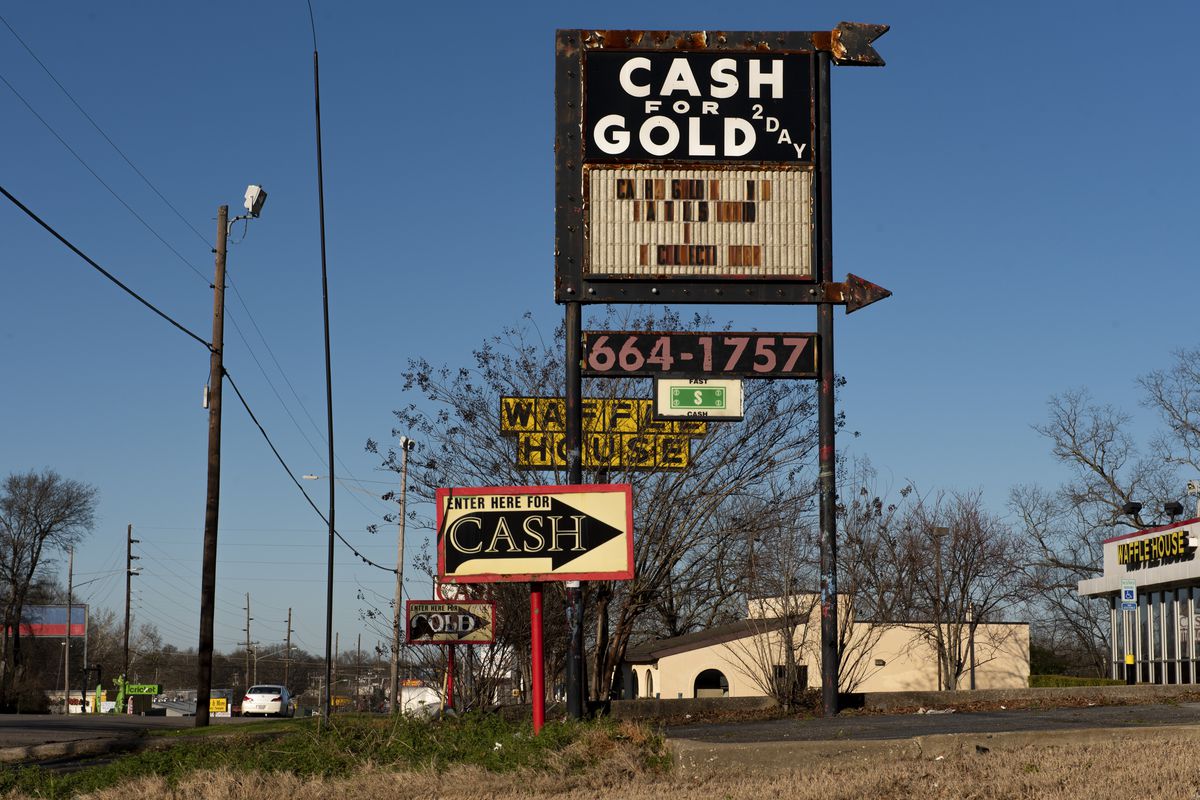
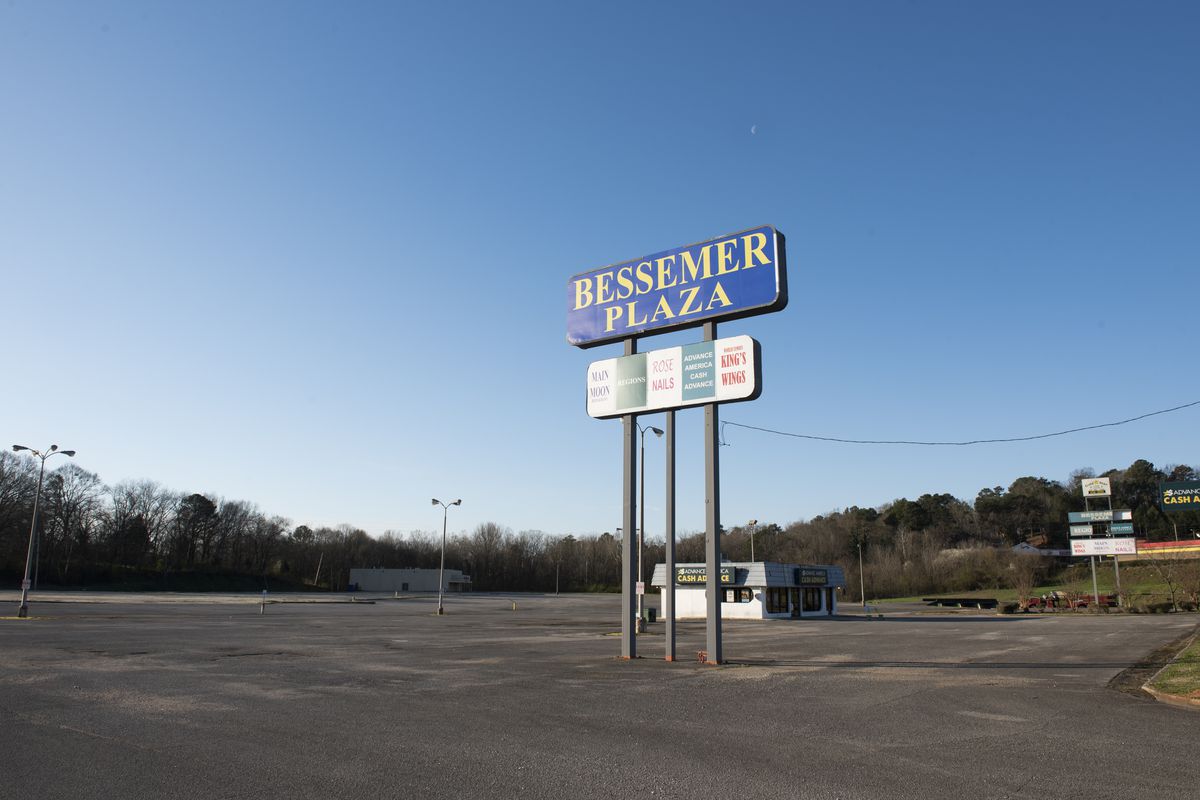
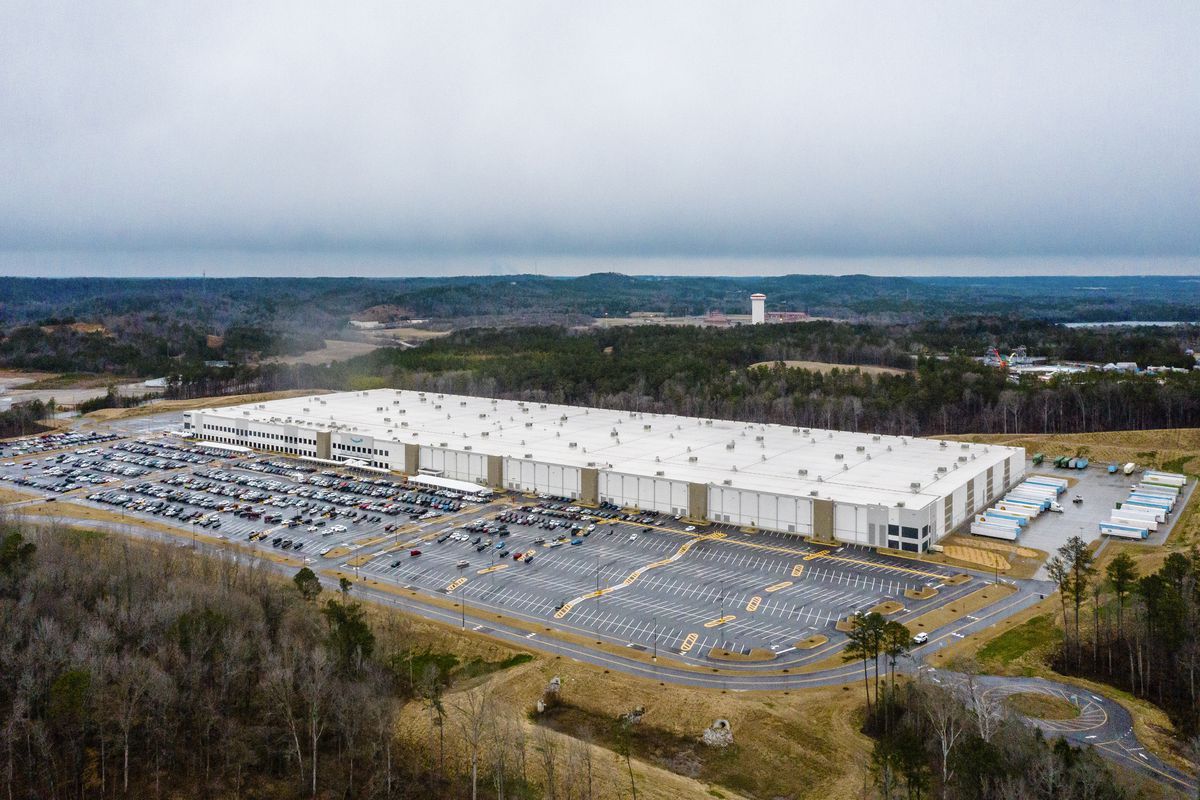
Here, Amazon didn’t seem to need to worry about the kind of public outcry and government oversight that has accompanied its efforts to expand in cities like Seattle and New York. Alabama is a Republican-run, pro-business state, one of 28 in the nation that keeps a so-called “right to work” law on the books. These laws weaken unions by making union membership at unionized companies optional; workers can enjoy the benefits of the union without paying dues, which eats away at union resources and makes it more difficult for workers in other shops to organize. (King, who saw labor and the fate of Black Americans as “closely intertwined,” said that right-to-work laws “rob us of our civil rights and job rights.”)
However, the emerging narrative that Bessemer is an unlikely or surprising place for an epic unionization fight doesn’t hold much water. Despite those anti-union barriers and pro-business attitudes, union density in Alabama still hovers around 8 percent — not much lower than the national average of 10 percent. At its peak, union density in the state topped out at 25 percent. Much of that is because of its manufacturing history. The United Mine Workers of America has been in the state since the early 1900s, Smith explained. “Alabama has always been the most organized Southern state, and remains so today, even though it is the birthplace of right-to-work.”
BHM1 threw open its doors in March 2020, as the Covid-19 pandemic was just beginning its deadly procession through the South. The excitement over the influx of new jobs eventually gave way to fear and frustration as workers became familiar with their roles within the machine. It took time for word to spread that the sprawling, 850,000-square-foot fulfillment center on the hill wasn’t living up to its lofty promises, and that the people inside kept getting sick.
But Bessemer’s story doesn’t begin with Amazon. Like so many others, it starts with steel.
Founded in 1887 by coal baron Henry DeBardeleben and named after British industrial inventor Henry Bessemer, this ailing satellite of Birmingham has a history of development and dissent.
The city once hummed with activity, its robust manufacturing industry fueled by steel, iron ore, and coal. A Pullman-Standard railroad-car factory took pride of place downtown, and Jefferson County itself was ringed by coal mines.
In 1920, thousands of miners went on strike for union recognition and higher wages — one effect of unions is that they keep wages high — and the conflict quickly turned ugly. At that point, Alabama’s coal mines were racially integrated, with Black and white miners working side by side; public opinion soon turned against the miners and inflamed racial tensions within the ranks. The governor called in state militia and state police to help break the strike, and the effort ultimately collapsed without making significant gains.
Sixteen striking miners, the majority of them Black, were killed during the violence.
But unions themselves remained. In Alabama, at least, the Retail, Wholesale, and Department Store Union was known mostly for its work organizing poultry plant workers and winning successful contracts in that notoriously low-paid, brutal industry, long before the first group of Amazon workers came calling.
Rev. Gregory Bentley, pastor of the Fellowship Presbyterian Church in Huntsville, and president of the city’s Southern Christian Leadership Conference chapter, has been a vocal supporter of the union effort, which he describes as part of a broader struggle against white supremacy and capitalism.
“This is the unfinished business of the civil rights movement,” Bentley says, noting King’s support of Memphis’s striking sanitation workers on the eve of his assassination. “We thank God for those who came before us and who paved the way and carved out some space for us to maneuver in. But we have to serve the present age, to make sure it comes to full expression.”
If there is some biblical force that “Big Mike” Foster represents, it is this: the holy spirit. As a devout Christian, Foster — who has traveled from his home in nearby Decatur to Bessemer to help with the union effort — is hardly unique among his peers; if anything, he’s the norm, though his room-filling personality stands out. Once he gets going, it’s like stumbling into a two-person tent revival, with Foster at the pulpit beckoning you forward.
He told Vox that he recently began speaking at his church and posting his sermons on Facebook, crediting that experience with his newfound comfort in front of a microphone (and a video camera) since Bessemer began making headlines. “That’s the mission that God has me on, to help people and to be bold in doing it because God wants soldiers,” he explains. “So as long as I have him, I know I’m gonna win.”
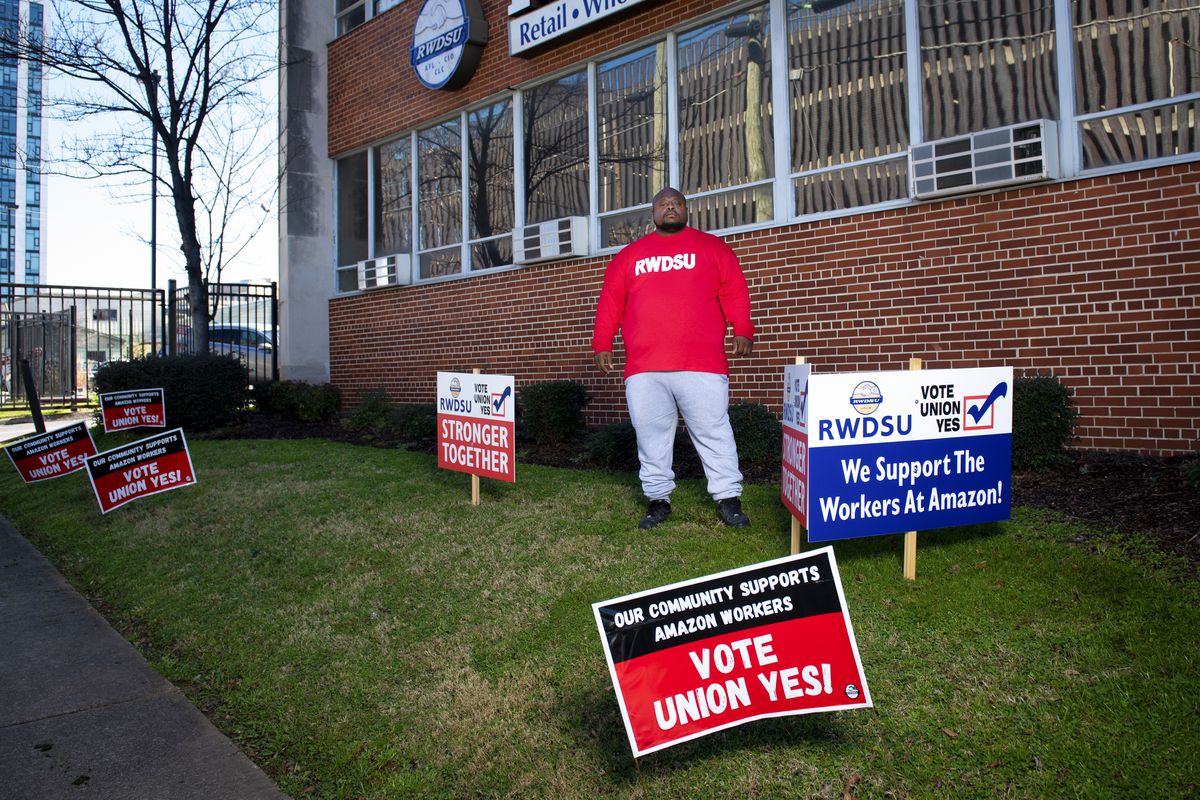
Religion has played a role in any number of labor struggles, from early-20th-century Jewish organizers who led major strikes to the Catholic Worker movement of the 1930s to the Black religious leaders who led meetings and demonstrations during the civil rights era.
Even in Amazon’s own recent history, the US’s nebulous separation of church and state has fallen in its workers’ favor. One recent significant worker-organized action against the company came from a group of Somali Muslim warehouse workers in Minneapolis, who forced Amazon to the bargaining table and demanded the company address ongoing racial and cultural sensitivity issues, and allow Muslim workers appropriate time for prayer breaks.
Though Foster does not work at Amazon, for him, providing encouragement, inspiration, and solidarity to his fellow workers in Bessemer is not just his role as an organizer; it’s his ministry.
“Some [Amazon workers] just call me just to vent,” he says, “and I will sit up on the phone with them for 30 minutes at a time, building that relationship, because it’s more than just organizing Amazon. We’re also here for the community to show that we’re not just a business. This is somewhere where you can come and be treated the way you’re supposed to be treated. This union is something that we’re doing out of our heart.”
Foster grew up in Decatur, Alabama, in what he describes as one of the city’s roughest housing projects, a “drug-infested” place that was eventually torn down. He was raised by a single mother who worked long hours to care for him and his four brothers, and Foster quickly learned how to take care of himself, too.
It wasn’t easy — at one point, he survived being shot — but Foster persevered, and has since become a devoted family man and 18-year veteran of the RWDSU-represented poultry plant where he began working as a young man. He worked his way up the ranks and became involved in the union, for which he now serves as a shop steward.
Along the way, his relationship with the church changed, too. About three years ago, he says he heard the voice of God speaking to him, telling him it was time to redirect that boundless energy into spreading the good word. “My heart is for the people,” he explains.
Like any good spiritual shepherd, Foster will often pray with workers. “I have done this with Amazon workers, who’re coming out because they’re on last chance, because of the TOT [time off task], and they’re just fearing that they’re gonna make another mistake and get fired,” he says. “My phone is always on, and I can always make time to talk with someone or help someone. And I believe that’s just what God has asked me to do. That’s my mission.”
For Jennifer Bates, the fight is more personal. Since May 2020, the 48-year-old has been employed at Amazon as a “Blue Badge Ambassador,” training new workers. She has joined Foster as one of the campaign’s most fearless public faces. She makes $15.30 for each hour of her regular 10-hour shifts (though when I call her in late February, she’s wrapping up a week of shorter shifts, on doctor’s orders, due to a medical issue with her legs). Her elegant visage has graced multiple media reports, but she says she’s not interested in reaping attention for herself.
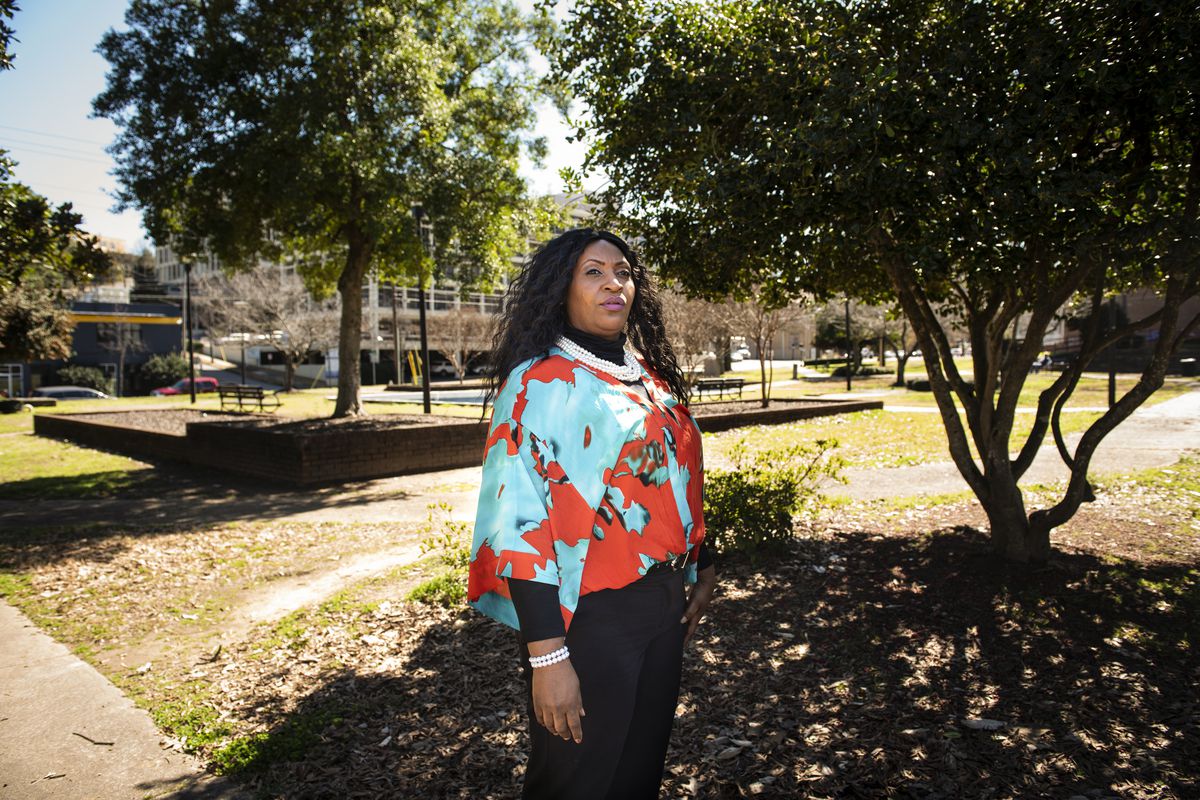
She is guided by her faith, which has been a cornerstone of her life since she was 6, when she would walk down a dirt road with her sister to meet her grandmother for church. Bates grew up in Marion, Alabama, a small city about an hour and a half drive from Bessemer. Despite its humble stature, Marion occupies an outsize role in civil rights history; in 1965, a Black man named Jimmie Lee Jackson was shot and killed by Alabama state trooper James Bonard Fowler during a civil rights protest. His killing inspired the first Selma-to-Montgomery march, and King spoke at Jackson’s funeral. Bates was born eight years later.
She has always worked hard. At 13, Bates was picking okra in a neighbor’s field for a few dollars a week, and her first legal job, at a Hardee’s, came at 16. She eventually married and made her way north to South Philadelphia; she later returned to Alabama, where she’s since worked in restaurants, in retail, as a 911 and police dispatcher, and in factories making automobile parts.
She has also been a children’s choir director, a praise and worship leader, an administrative assistant, and a motivational speaker, and also served as a confidante for troubled young people in the community. Years later, that same warm empathy has made her a beacon to her anxious Amazon coworkers.
Before she made the move to Amazon, Bates spent a decade working at a nearby US Pipe plant, where she was a member of the steelworkers union. Her sister was already working at Amazon, and in May 2020, in the midst of the pandemic, Bates decided to make a change. The night before she started her new job at Amazon, she sat in her car for two hours and cried.
“I felt like I was leaving my family,” she explains. But it wasn’t until the union campaign was in full swing and momentum had been building for months that she realized: This was what had drawn her to Amazon.
During the earlier days of the campaign, when most Amazon workers were justifiably leery of putting themselves out there, Bates jumped in feet first. One of her other factory jobs had been unionized as well, so she came to Amazon armed with that experience.
“So many times we walked away when we could have helped somebody, and said, ‘I’m gonna save myself and the rest of y’all can sink if you want to,’” she says, “But this one right here was one of those where I said, ‘You know what, I’m not running. I’m not running.’ For years, I’ve seen people are being mistreated. I’ve seen people just get fired. When is it gonna stop?”
RWDSU organizers begin each meeting and every meal with a prayer, often led by Foster. A community support rally just days before the ballots went out in February kicked off with a recording of the Lord’s Prayer that boomed over a set of borrowed loudspeakers that some sympathetic teamsters had hauled down from Boston for the occasion. Workers spoke about their overwhelming desire to “make things better” for their coworkers, and how they felt called to act; one organizer, a talkative pastor from Tennessee, explained how God had told him that this was where he needed to be right now.
Even Josh Brewer, an area union representative for RWDSU’s Mid-South Council and the lead organizer for the BHM1 Amazon union campaign, moonlights as a licensed Baptist minister, and worked as a youth pastor before he joined the labor movement.
His kind eyes and ready smile are always visible above his ever-present RWDSU-branded mask, but that youth pastor energy really shines through when he’s bouncing around excitedly giving a new campaign update or joking around with workers. Like Foster, his faith came to him later in life after he overcame great hardship, but it now impacts every decision he makes. Brewer has found plenty of fellow believers in his RWDSU area council, where faith is just another form of solidarity.
“This is a flock, and this flock is asking us to shepherd them, keep them safe,” he says, “to give them that kind of shield, and to provide for them, and in a lot of ways it’s the same thing we ask of our faith.”
As Rev. Bentley explains, none of that is a coincidence. “Jesus in his own ministry was clearly on the side of the oppressed, people who were at the margins, people who had to work from sunup to sundown and still not make enough to subsist,” he explains. “One of the most seminal stories in the Bible, the Exodus story, is really a labor story about folk working for free — slavery,” he adds.
Simply because a practice is established does not make it just or reasonable; the fact that Amazon has so far been able to grind its workforce into dust does not mean that it should be given carte blanche to continue to do so, workers say. Whatever is, is not necessarily right, and those who wish to see things changed entirely often need to take matters into their own hands in order to forge a brighter new reality into being. As Rev. Bentley told me, “Spiders, when they work together, can tie up a lion.”
Bessemer, Alabama, was built on steel and watered with the blood and sweat of a forgotten generation. It was knocked down, left to rot, then sucked into the gaping maw of a global giant. Now the city’s true future rests not in the Amazon jobs that Bessemer so desperately needed, but in the hands of those thousands of Amazon workers. All that’s left to do is pray.
“It’s about time somebody really spoke out and said something,” Bates says. “Somebody who isn’t afraid of the big giant.”
Who better than Bessemer?
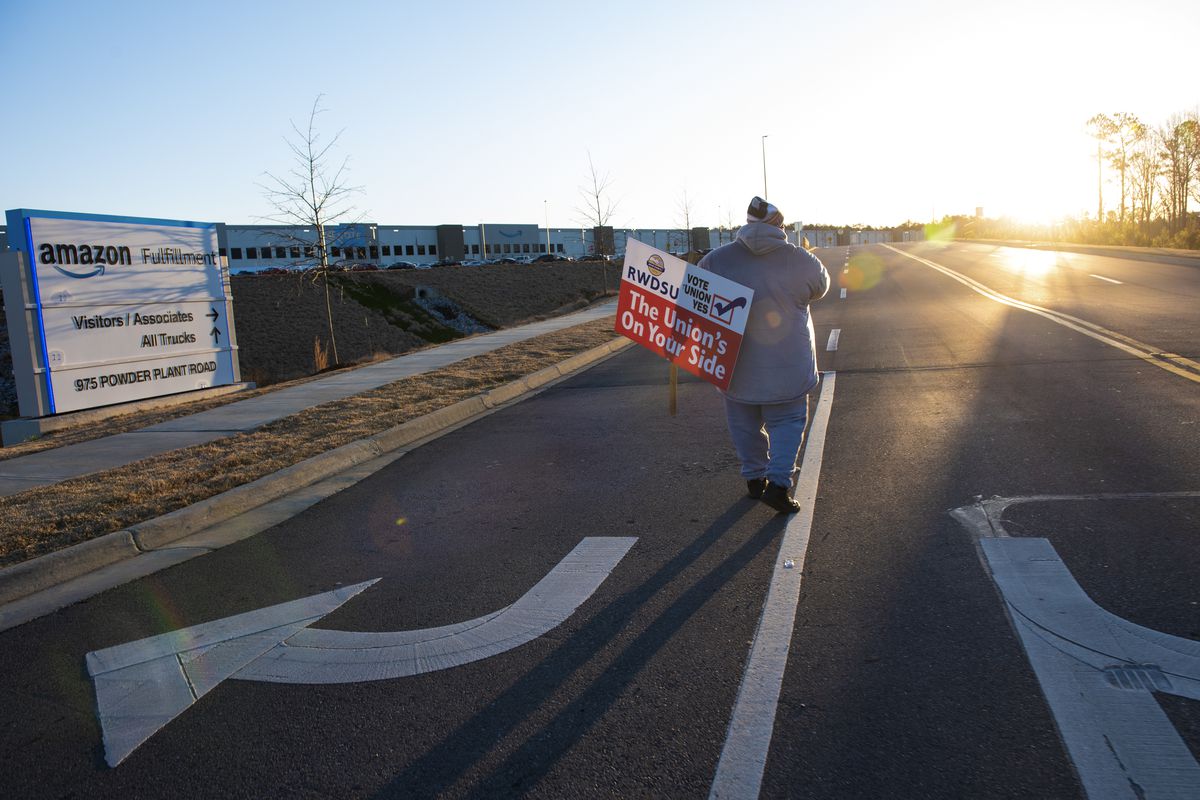
Kim Kelly is a freelance journalist specializing in labor. Her work regularly appears in Teen Vogue, the Washington Post, and other publications. Her forthcoming book, Fight Like Hell, a “marginalized peoples’ history of labor in the United States,” will be published by One Signal.
Andi Rice is an independent photographer based in Alabama.

